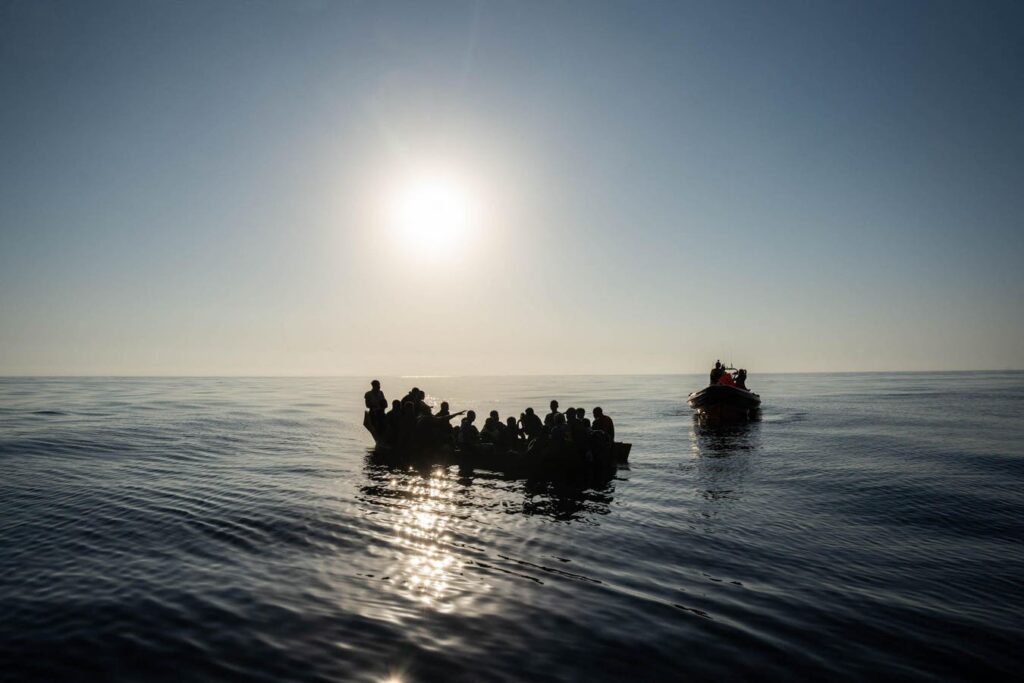People attempting to cross the Mediterranean on a small boat prior to being rescued by the NGO … [+] Proactiva Open Arms. (Photo by Matias CHIOFALO / AFP) (Photo by MATIAS CHIOFALO/AFP via Getty Images)
AFP via Getty Images
Italy has begun its controversial scheme to send asylum seekers arriving by sea to Albania for processing. Years in the making, the scheme is a response to a perceived crisis of people arriving on Italy’s shores seeking shelter. The activation of the scheme has been condemned by humanitarian NGOs operating in the Mediterranean. It also faces legal complications from a European Court of Justice ruling.
The agreement between Italy and Albania for offshore processing was signed in November 2023. It provides for two detention centers in Albania, where up to 36,000 people per year can be sent to have their asylum claims in Italy processed, though only if they are from countries Italy considers ‘safe.’ The scheme is reported to cost nearly three quarters of a billion dollars over five years.
On October 14th 2024, it was reported the scheme had become active and the first group of people were being transported to Albania. Among them were reportedly ten people from Bangladesh and six from Egypt. Both countries are on Italy’s ‘safe’ list.
The Albania offshore processing scheme is the first of its kind for an EU member state, though it is in keeping with existing Italian and European policies of ‘externalization’ in which third countries are equipped, funded, or both, in order to prevent people reaching Europe’s shores from their territory. It also echoes the notorious Rwanda scheme that the previous conservative government in the U.K. spent hundreds of millions of dollars on preparations for. Current U.K. Prime Minister Keir Starmer scrapped the scheme before anybody was deported under it, though he has since expressed admiration for Italy’s Albania scheme.
The scheme is designed to reduce the amount of people crossing the Mediterranean to seek shelter in Europe. This comes amid concern for the growing death toll of people trying such crossings, as well as the political atmosphere in Italy and elsewhere in Europe, where concerns over irregular immigration dominate political discourse.
At the time the scheme was announced, Amnesty International said they believed “the agreement is highly unlikely to reach its stated aim in terms of migration management,” meaning that the scheme would probably not more people from trying to reach Italy via the Mediterranean. Deterrence is a hotly disputed topic among migration analysts and in general the empirical evidence suggests the effect is small. At the same time, Amnesty said the scheme’s implementation “would have a negative impact on a range of human rights, including the rights to life and physical integrity of people in distress at sea.”
Now, humanitarian search and rescue NGOs operating in the Mediterranean, in lieu of EU state search and rescue operations, are speaking out against the activation of the Albania scheme.
“We strongly oppose Italy’s relocation of survivors to Albania,” said Mirka Schäfer, with the NGO SOS Humanity. “The Italy-Albania agreement violates international maritime law and risks further eroding fundamental rights of refugees.”
The scheme also faces potential legal challenge after a ruling from the European Court of Justice earlier in 2024.
One of the bases for Italy’s claim to legitimately be able to send people to Albania for processing is that they are from countries considered ‘safe’. The ruling from the ECJ threatens this claim. Earlier in the year the court ruled that the Czech Republic could not unilaterally declare parts of Syria safe to return people to, as an entire country must be considered safe before it can be declared so. In practice, given the presence of conflict, instability and other forms of danger in parts of many of the countries Italy considers safe, including Algeria, Cameroon, Egypt, Côte d’Ivoire, Nigeria, and Tunisia among others, the Albania scheme is likely to face further challenge.
For now, what this safe list means in practice is that anyone sent to Albania would likely not have their asylum applications approved, unless they can show they face some specific form of persecution or threat to their life or wellbeing.
Source link : https://www.forbes.com/sites/freylindsay/2024/10/15/humanitarian-ngos-condemn-start-of-italys-albania-migration-scheme/
Author :
Publish date : 2024-10-15 13:12:00
Copyright for syndicated content belongs to the linked Source.
